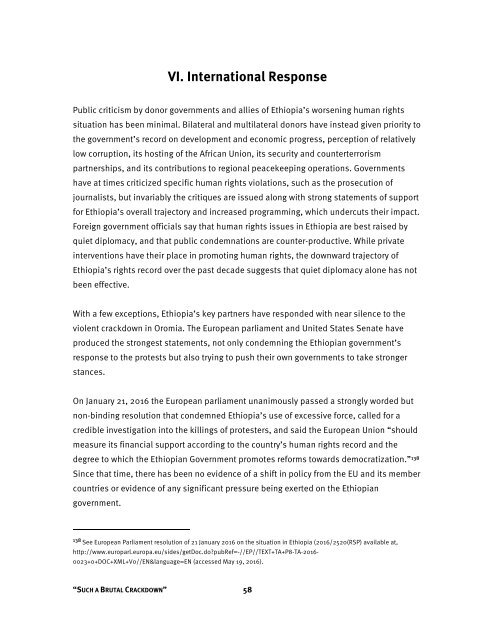“Such a Brutal Crackdown”
ethiopia0616web
ethiopia0616web
Create successful ePaper yourself
Turn your PDF publications into a flip-book with our unique Google optimized e-Paper software.
VI. International Response<br />
Public criticism by donor governments and allies of Ethiopia’s worsening human rights<br />
situation has been minimal. Bilateral and multilateral donors have instead given priority to<br />
the government’s record on development and economic progress, perception of relatively<br />
low corruption, its hosting of the African Union, its security and counterterrorism<br />
partnerships, and its contributions to regional peacekeeping operations. Governments<br />
have at times criticized specific human rights violations, such as the prosecution of<br />
journalists, but invariably the critiques are issued along with strong statements of support<br />
for Ethiopia’s overall trajectory and increased programming, which undercuts their impact.<br />
Foreign government officials say that human rights issues in Ethiopia are best raised by<br />
quiet diplomacy, and that public condemnations are counter-productive. While private<br />
interventions have their place in promoting human rights, the downward trajectory of<br />
Ethiopia’s rights record over the past decade suggests that quiet diplomacy alone has not<br />
been effective.<br />
With a few exceptions, Ethiopia’s key partners have responded with near silence to the<br />
violent crackdown in Oromia. The European parliament and United States Senate have<br />
produced the strongest statements, not only condemning the Ethiopian government’s<br />
response to the protests but also trying to push their own governments to take stronger<br />
stances.<br />
On January 21, 2016 the European parliament unanimously passed a strongly worded but<br />
non-binding resolution that condemned Ethiopia’s use of excessive force, called for a<br />
credible investigation into the killings of protesters, and said the European Union “should<br />
measure its financial support according to the country’s human rights record and the<br />
degree to which the Ethiopian Government promotes reforms towards democratization.” 138<br />
Since that time, there has been no evidence of a shift in policy from the EU and its member<br />
countries or evidence of any significant pressure being exerted on the Ethiopian<br />
government.<br />
138 See European Parliament resolution of 21 January 2016 on the situation in Ethiopia (2016/2520(RSP) available at,<br />
http://www.europarl.europa.eu/sides/getDoc.do?pubRef=-//EP//TEXT+TA+P8-TA-2016-<br />
0023+0+DOC+XML+V0//EN&language=EN (accessed May 19, 2016).<br />
“SUCH A BRUTAL CRACKDOWN” 58


